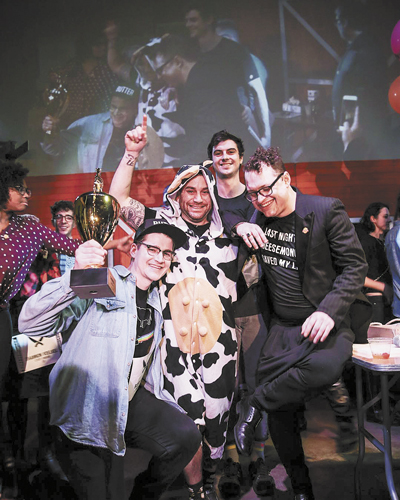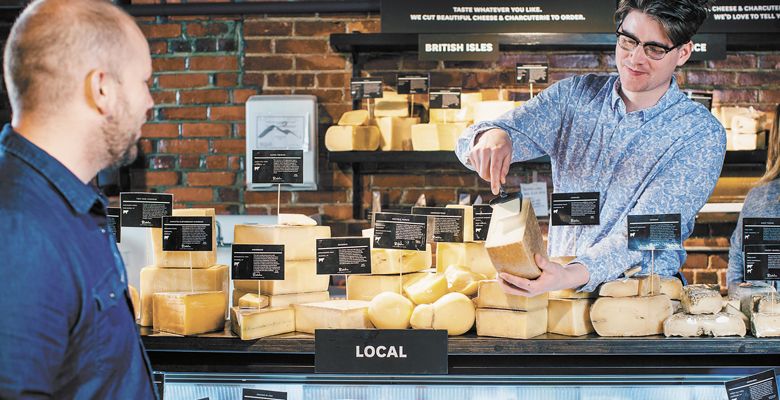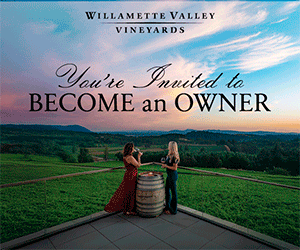Last Call
Cheesemonger Rory Stamp
Rory Stamp, winner of the 2018 Winter Cheesemonger Invitational in San Francisco, has built an impressive résumé the past six years. He began as a farmhand on an organic dairy in Martha’s Vineyard, managing a raw milk cooperative for students at Wesleyan University. He then completed the Vermont Institute for Artisan Cheese intensive cheesemaking course and apprenticed at Consider Bardwell Farm. Stamp’s also worked for Formaggio Kitchen in Cambridge, Massachusetts, and Shelburne Farms in Vermont. In 2017, he joined the Dedalus Wine team as the artisan food manager, establishing Burlington’s sole full-service cheese/charcuterie counter within the wine shop, bar and market.
Q: How did you first become interested in cheese?
A: I grew up on skim milk and absolutely detested it. What value is there in this odorless, tasteless, watered down substance? In high school in rural Vermont, I had my first taste of raw milk from the farm and everything changed. I had my epiphany when incredible cheesemakers like Jasper Hill and Vermont Creamery started selling cheese to the local co-op, and I was hooked. How could something as simple as milk yield such diverse and deliciously expressive results? All it takes is bacteria, enzymes, salt, a little force, temperature and time — cheesemaking is the perfect balance of science and art.

Q: What did you enjoy most at the most recent Cheesemonger Invitational?
A: The highlight of every Cheesemonger Invitational, whether as a spectator or a participant, is the opportunity to connect with industry peers and producers. From Florida’s best cheesemonger to an award-winning cheesemaker from County Cork, Ireland, this group represents some of the most talented, passionate individuals in cheese. Adam Moskowitz, the gregarious, cow-costume-clad emcee and CMI founder, is the force that brings these incredible people together. In starting this event, he established the country’s first industry event for cheesemongers to celebrate the unsung heroes of the walk-in cooler, the deli-case and the bona fide cut-to-order cheese shop.
Q: Just like wine, cheese is a neverending education. What did you discover/learn during the recent competition?
A: Again, the opportunity to connect with producers and exporters is one of my favorite aspects of CMI, and my career in general. It’s one thing to extrapolate from a label or shelf talker, to regurgitate a webpage or blog post, and something entirely different to talk about what it’s like to lead the cows to pasture, feel the curds in the vat and watch these cheeses mature in the cave. A good cheesemonger, like a sommelier, is an excellent storyteller, and these personal interactions with makers are what drive and excite me on a daily basis. And the cheesemongers: I am constantly impressed by the tremendous talent and creativity of my industry colleagues. Columbian coffee and washed-rind cheese? A bánh-mì using France’s Mimolette? The bar is raised every time CMI is held.
Q: What’s the best cheese(s) you’ve ever tasted?
A: This is an impossible question, but I’ll give you a short list. Robiola di Roccaverano (at Formaggio Kitchen, Massachusetts), Beaufort d’Alpage (at Darien Cheese & Fine Foods, Connecticut), Jasper Hill Farm Winnimere (Vermont), Sugar House Creamery Dutch Knuckle (New York), raw cheddar curds from Shelburne Farms (Vermont). I can assure you this answer varies on a daily basis, but these are the most memorable tastes of my last six years in cheese.
Q: When pairing wine and cheese, what is important to remember?
A: Matching weight and region are great principles. The adage of “what grows together goes together” is a good one and can be applied to style as well as region. Cheery, alpine Pinot Noir from Oregon bears enough in common with Alsace that it will probably love the pungence of Alsatian münster. Especially when pairing one wine with a range of cheeses, I avoid full-bodied, high-tannin reds and generally prefer low-tannin, high-acid wines. Champagne pairs with virtually everything — trust me, I’ve tried it.











